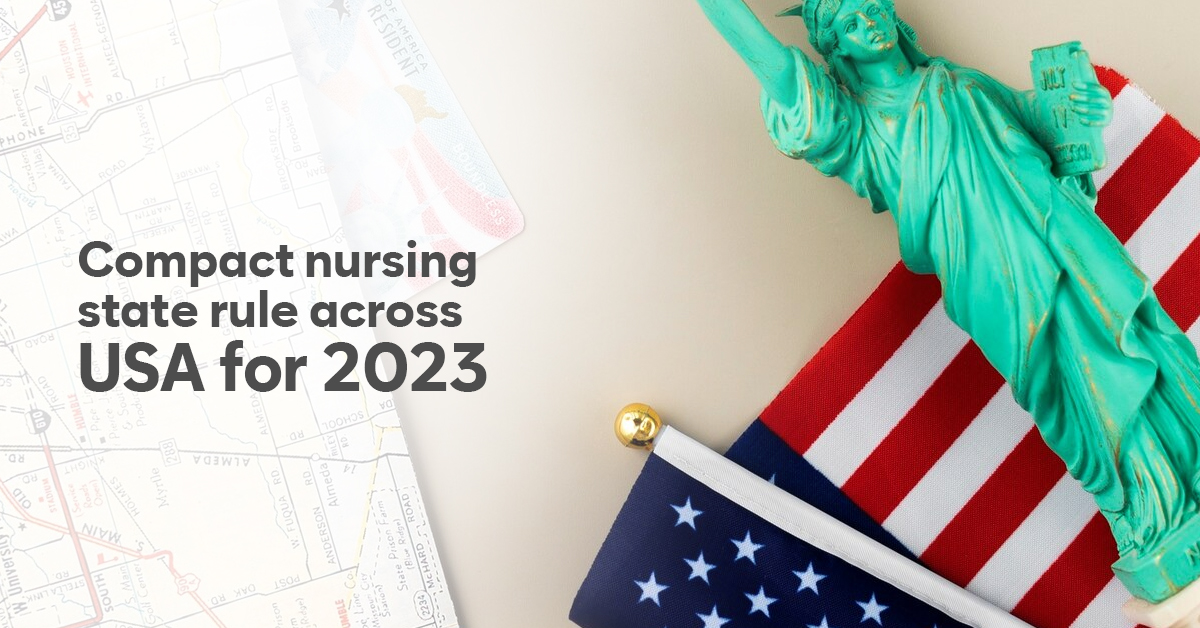In the dynamic world of healthcare, adaptability, and efficiency are crucial, and this is true for nursing licensure as well. The Nursing Licensure Compact (NLC) has been a transformative agreement, allowing nurses to practice seamlessly across multiple states. In 2023, the Enhanced Nursing Licensure Compact (eNLC) is taking this concept further, bringing with it a set of standards designed to enhance the licensure process.
Compact Nursing States: The eNLC Members
As of January 2023, the eNLC comprises forty states, each allowing nurses to hold a single compact license with the ability to practice in any eNLC member state. The list includes Alabama, Arizona, and Arkansas, and extends to states like Texas, Vermont, and Washington. Guam, though not a state, is also part of the agreement, enabling nurses with multi-state licenses to practice in Guam.
While twenty-four of the original NLC states have fully embraced the eNLC, eight more are in the process of doing so, with legislation pending. Pennsylvania and the Virgin Islands have passed the necessary laws but are still awaiting implementation.
Importance of Nursing Compact States
The goal of the eNLC is to increase access to healthcare, reduce costs for various stakeholders, and promote efficient healthcare delivery. It became effective on July 20, 2017, leading to the issuance of new multi-state licenses for nurses transitioning from the old license. New nurses entering the workforce in eNLC states can immediately practice across all member states, eliminating delays between contracts and reducing application fees.
However, the road to universal adoption has not been without challenges. Some states have faced resistance, either delaying or hesitating to join the compact. Despite ongoing efforts, Hawaii, a highly sought-after location for travel nurses, is not part of the eNLC.
What the eNLC Means for Nurses
For nurses currently practicing in states with pending legislation, there’s no immediate action required. Once a state becomes part of the eNLC, the state board will communicate with registered nurses, who will then need to update their addresses to determine compact license eligibility. Nurses not due for license renewal won’t incur additional fees when transitioning to the eNLC.
Residency is a key factor. Nurses must claim residency in an eNLC state to apply for a compact license. Non-residents can apply for a single-state license by endorsement but won’t have the compact license privileges.
To stay informed, nurses are encouraged to sign up for the Nursys e-Notify system, providing real-time updates on licensure changes, expirations, renewals, and disciplinary actions. This service, supported by the U.S. Board of Nurses and NCSBN, is free of charge and enhances patient safety.
States with Pending Nursing Licensure Legislation and Ongoing Developments
States like Alaska and New York, initially hesitant, now have pending legislation for the eNLC, showcasing a shift in perception. The Alaska Board of Nursing, previously unsupportive, now endorses the compact license after receiving overwhelming support from resident nurses.
In a recent development, Washington became the 40th state to enact the eNLC, a significant milestone in promoting public protection through coordinated efforts among nursing boards.
Remaining Challenges: States without Legislation
Despite the momentum, several states and territories, including California, American Samoa, and Hawaii, have yet to adopt eNLC legislation. California’s denial at both the statehouse and senate levels underscores the continued challenges and varying perspectives surrounding compact licensure.
In conclusion, the evolution of compact nursing state rules across the USA reflects the dynamic nature of healthcare regulation. The eNLC’s growth signifies progress, yet challenges persist. As the landscape continues to shift, nurses play a crucial role in navigating these changes, ensuring a streamlined and effective approach to licensure for the betterment of healthcare delivery nationwide.




